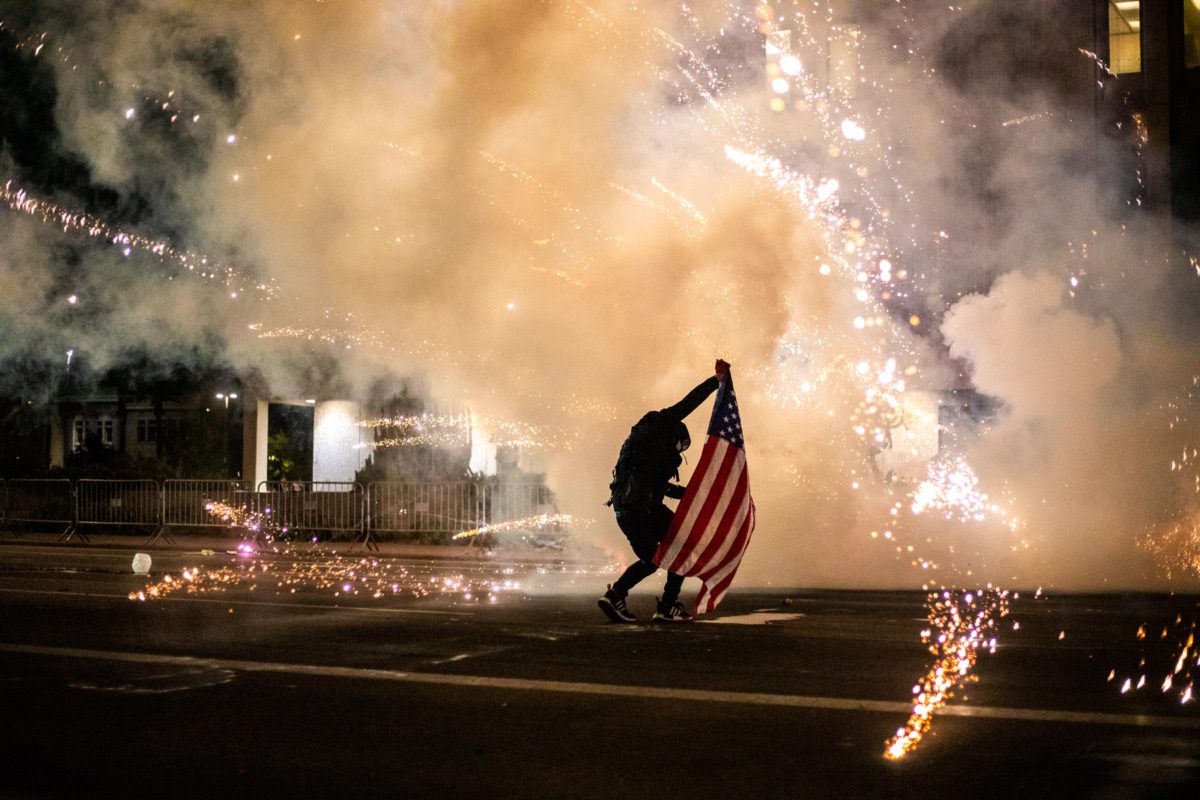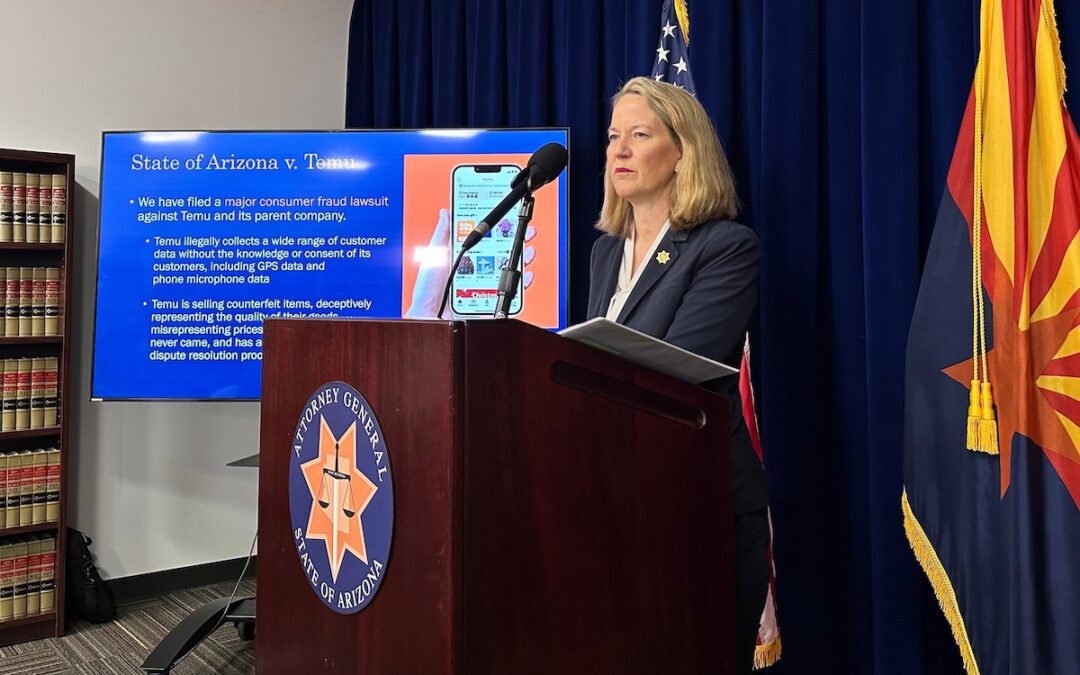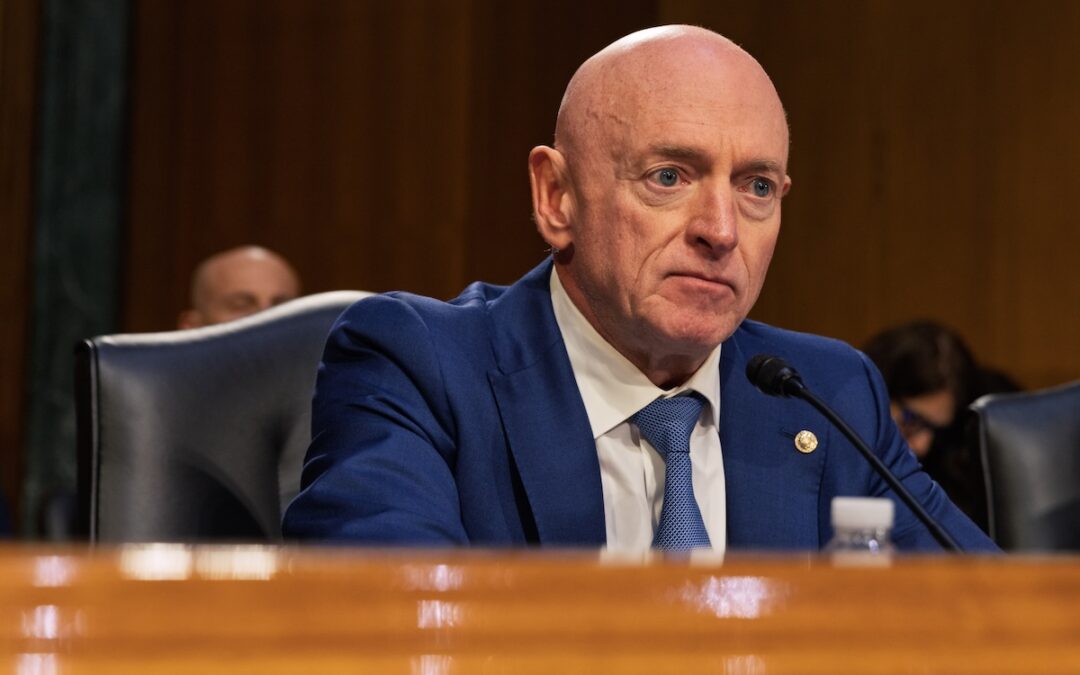
In this May 30, 2020, file photo a protester uses an American flag to shield himself from tear gas used by Phoenix police to disband a Black Lives Matter protest downtown – one of many nationwide over the death of George Floyd, a Black man, at the hands of a Minneapolis officer. (File photo by Blake Benard/Special for Cronkite News)
WASHINGTON – Phoenix officials have offered assurances that police reforms will continue, despite President Donald Trump’s order ending federal scrutiny of alleged misconduct by local law enforcement.
For families of people victimized by Phoenix police in recent years, the assurance is not enough.
They’re dismayed that the Department of Justice will no longer serve as a check against civil rights abuses and excessive force. Since 2016, police misconduct settlements have cost the city at least $40 million.
“Even though you paid out $3 million to a family, you fired the cop, the cop got his job back, and my brother’s shooting is still listed as justified,” said Katie Baeza, whose brother, Ryan Whitaker, was shot and killed by police responding to a neighbor’s complaint about noise.
“You’re trying to tell us that you’re trying to make reforms and you’re trying to do all this, but you still can’t be transparent with the public,” Baeza said.
Want Arizona news in your inbox each morning? Sign up for our free newsletter.
Danny Ortega, a Phoenix attorney who has represented clients in lawsuits against police in Phoenix warned that reforms are apt to be less urgent without federal pressure and specialized oversight.
“The likelihood that you will do as thorough a job as necessary is based upon your past practices,” he said, using a dirty house as an analogy: the clean-up goes better “when somebody else who is in the house-cleaning business comes in.”
On May 21, the DOJ announced it would end oversight of police departments in Phoenix and six other cities nationwide plus the Louisiana State Police – a Biden-era crackdown prompted by alleged patterns of civil rights violations.
The move scrapped court-ordered consent decrees between the Justice Department and the cities of Minneapolis and Louisville, Kentucky.
BACKGROUND: Phoenix police have pattern of violating civil rights and using excessive force, Justice Dept. says
At the same time, Attorney General Pam Bondi retracted findings of civil rights violations in Phoenix and four of the other cities.
Critics say that effectively means turning a blind eye to police misconduct.
The Phoenix investigation stemmed from a series of high-profile shootings by officers and aggressive treatment of protesters.
In 2018, Phoenix had the most fatal police shootings, 23, of any U.S. city, according to the National Police Foundation.
In a 2019 incident, an officer swept the legs from under a handcuffed shoplifting suspect and a second officer pointed a gun at a pregnant woman and her children seated in the car.
That same year, the death of Jacob Harris raised alarm. The Black teenager was shot in the back by an officer.
After a three-year investigation, the DOJ issued a scathing 126-page report in June 2024. Among the findings: Phoenix police routinely engaged in unlawful brutality, violated the rights of protesters and unhoused people and targeted Black, Hispanic and Native American people.
Such misdeeds have cost local taxpayers millions.
From 2016 to 2023, the city spent more than $40 million to settle lawsuits and claims involving officers’ behavior, according to the DOJ report.
In one $5.5 million case, officers killed a man who had thrown rocks at their marked vehicle. The officers called for non-lethal backup but instead of waiting, confronted him with guns drawn. They shot him four times after he raised his arm to throw another rock.
Another altercation resulted in a $475,000 settlement. In that case, officers held a family at gunpoint in a parking lot outside a store from which a 4-year-old girl had taken a doll.
In the $3 million Whitaker case, two officers knocked on his apartment door after a neighbor called in a complaint about possible domestic violence. Loud music may have drowned out the officers identifying themselves as police.
Whitaker’s girlfriend said a recent late-night knock had made him nervous, which is why he picked up a handgun before opening the door. Five seconds later he was dead. Officers initially claimed he’d pointed a gun at them but body camera footage showed otherwise. The officer who shot him was fired and later reinstated.
In May 2022, President Joe Biden signed an executive order directing the DOJ to intensify its focus on local police misconduct. He cited a need to rebuild trust after the murder of George Floyd by Minneapolis officers in 2020, which set off nationwide protests, and other fatal encounters between police and innocent civilians.
“There are places in America today, particularly in Black and Brown communities and other communities of color, where the bonds of trust are frayed or broken,” Biden said at the time.
The Justice Department opened an investigation of the Minneapolis police and another in Louisville, where officers using a no-knock warrant used a battering ram to enter the apartment of a woman named Breonna Taylor without warning in 2020. When her boyfriend fired his gun at what he thought were intruders, the officers responded with gunfire.
The American Civil Liberties Union said that as “the federal government retreats from oversight” it will fill the void by seeking evidence of misconduct in Arizona, Tennessee, Massachusetts, New York, Mississippi, Minnesota and Kentucky – the states where the department under Biden had identified patterns of police abuse and misconduct.
“The DOJ’s damning and well-documented findings came from thousands of records, including hours of videos and interviews with personnel at the Phoenix Police Department. Now is not the time to look away,” Jared Keenan, legal director at the ACLU of Arizona, said in a statement.
Trump also sought to curtail federal oversight of local police during his first term.
In 2017, Trump ordered a sweeping review of all consent decrees put in place by the Obama administration. In 2018, his first attorney general, Jeff Sessions, raised the threshold for DOJ to force local jurisdictions into court-approved oversight pacts.
Biden reversed those moves, among others. His attorney general, Merrick Garland, instructed the FBI and U.S. attorneys to step up scrutiny of local police.
The Biden DOJ sought consent decrees with 11 police agencies around the country that federal authorities asserted had shown a pattern of misconduct, including Phoenix. Only Minneapolis and Louisville signed on.
Phoenix Mayor Kate Gallego welcomed Trump’s move to end the federal scrutiny, saying the city needs no prodding from the federal government to make improvements.
“We will continue to look for every opportunity to make sure we’re serving our residents in the best way possible,” she said in the statement. “I said many times that we would adopt reforms and see them through, regardless of the DOJ investigation, and I meant it.”
That includes “gathering better data, better interactions with residents, and greater accountability when we get it wrong,” she said.
The ACLU and other groups criticized the Phoenix Police Department’s handling of protests related to the Black Lives Matter movement in 2020 and the treatment of homeless people – particularly in the Zone, a large downtown encampment that police cleared in May 2023.
Much of the city’s homeless population sheltered in tents and under tarps in the Zone, in part because police funneled people there, according to the report.
City Manager Jeff Barton hired Michael Sullivan to lead the department a few months after Biden launched the nationwide probe of local police misconduct. Sullivan had served as a deputy commissioner in Baltimore – and before that in Louisville. He resigned from the Phoenix post in April and was named last week to lead the U.S. Capitol Police.
Sullivan has been credited with updating policies to ensure that force is used only when necessary. New policies require officers to render medical aid to suspects in distress and “to intervene, prevent, and stop misconduct or the excessive use of force whenever and wherever they observe it.”
The mayor’s refusal to enter a consent decree with the DOJ drew widespread support from leaders in both parties and police rank-and-file.
After the DOJ issued its report last June, Democratic Sen. Ruben Gallego – the mayor’s former spouse – called efforts to impose a consent decree “overly burdensome” and said compliance could cost the city $50 million.
Arizona conservatives also criticized the scrutiny, arguing the DOJ’s approach would restrict the ability of police to fulfill their duties.
State Senate President Warren Petersen, R-Queen Creek, called Trump’s move “complete vindication” that “will remove the handcuffs off our law enforcement so that they may do their jobs to keep the city of Phoenix and our citizens safe from criminals seeking to cause harm.”
U.S. Rep. Abe Hamadeh, R-Scottsdale, wrote to FBI Director Kash Patel in May asking him to rescind the findings issued last June. After Trump’s move, he lauded Trump for ending “the Biden administration’s malicious and oppressive oversight of local law enforcement agencies.”
The Phoenix Law Enforcement Association, which represents officers, called Trump’s move a “clear vindication” for the city and its department.
The city says it will continue to implement reforms.
“Significant progress is already underway and will continue as we fulfill our responsibility to serve and protect the community while building trust through transparent, effective, and constitutional law enforcement practices,” Dan Wilson, a spokesperson for the city’s Office of Accountability and Transparency, which provides oversight of the Police Department, said by email.
For more stories from Cronkite News, visit cronkitenews.azpbs.org.

Arizona attorney general sues Chinese online retailer Temu over data theft claims
Arizona Attorney General Kris Mayes announced Tuesday that Arizona is the latest state to sue Temu and its parent company PDD Holdings Inc. over...

Kelly bill would allow lawsuits over social media algorithms that promote violence, extremism
WASHINGTON – Lawmakers have struggled for years to regulate social media platforms in ways that tamp down misinformation and extremism. Much of the...

National Indigenous Domestic Violence Hotline provides culturally specific help
PHOENIX – Seven days a week, 365 days a year, the StrongHearts Native Helpline provides care and services for Indigenous people experiencing...

Report: Maricopa County Sheriff’s Office misused millions meant to remedy racial profiling
PHOENIX (AP) — The sheriff’s office for metro Phoenix spent millions of dollars budgeted for compliance costs in a racial profiling case over Joe...





